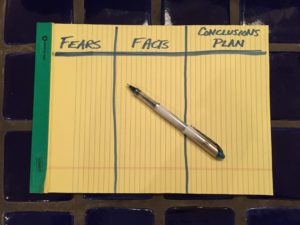Skill #1: Challenge Your Thoughts
Fear. We all have it.
I don’t know about you, but my fears can take on a life of their own. How to manage those messy thoughts is a marvelous skill. Without practicing it, my highly imaginative mind can fill in any blank with some worst-case-scenario and hit the accelerator! Once that happens, I’m running down roads from every bad horror movie or worst case scenario in my memory bank.`
We need to get fear out of the driver’s seat of our lives.
The state of fear or anxiety is a natural emotion intended to warn us of danger and protect our safety. It is probably a good thing if I am fearful walking alone in a parking garage at night. I will be more vigilant and aware of potential danger. Anyone would tell me to play it safe when walking alone at night. When our fears run away with us and become excessive, we find ourselves in trouble. We find ourselves living under a constant state of internal alarm.

The subsequent effect of the onslaught of stress hormones clouds our thinking capacity and negatively impacts our immune system and health. We need to get fear out of the driver’s seat of our lives.
What exactly is fear?
Fear is the mind’s interpretation of one’s anxiety. A fear is a thought that usually begins “I’m afraid (that/of/because) _______.” The relationship between fear and anxiety is bidirectional: we generate anxiety by a thought (“I’m afraid of ____”) and a feeling of anxiety can generate a fear (I’m anxious at night and I tell myself there something to fear in the dark).
Fear is the mind’s interpretation of one’s anxieties.
 Anxiety is part physiological and part psychological. Some of us are simply hardwired for it—I know I am. Anxiety tends to run in my family and I can be quickly and easily aroused: my heart rate shoots up, as does my blood pressure, my hands shake, knees feel weak, and my voice wavers. My mind races. It is not pleasant. We tend to look outside ourselves for the reason. That is a fear.
Anxiety is part physiological and part psychological. Some of us are simply hardwired for it—I know I am. Anxiety tends to run in my family and I can be quickly and easily aroused: my heart rate shoots up, as does my blood pressure, my hands shake, knees feel weak, and my voice wavers. My mind races. It is not pleasant. We tend to look outside ourselves for the reason. That is a fear.
Try this Skill
One skill to manage this messy process is to Challenge Your Thoughts with facts and rational thinking. If I fear the dark when home alone, I can rationally challenge that fear with facts like, “There is no one in the house with me. The alarm is set. I am safe. I’ve had this feeling before but it is not based in reality. There is nothing to fear in the dark.” Imagine for a moment making these rational statements to yourself. How do you feel?
Compare that to how you feel when you allow fear and irrational thinking to run away with you. Maybe you do the “What if…” game: “What if someone is hiding in the closet? What if someone crawls in my window while I am asleep? What if there is a monster under my bed?” How do you feel now? At the very least, those thoughts immediately contribute to your sense of unease and worst case, can set off a complete panic. Your internal dialogue affects your fear.
Is there a history to your fear?
Assess the level of danger around you if you are naturally tense or anxious. Ask questions like: Am I safe? Does this situation remind me of something in my past that set off an alarm? Am I otherwise vulnerable—hungry, not rested, stressed, dehydrated (which physiologically mimics panic symptoms), or fighting a real threat in another part of my life (hostile work environment, angry spouse, sick loved one, dangerous neighborhood)? If so, those are important. A threat in another area of one’s life can contribute to anxiety and fear leaking out into seemingly unrelated daily situations. If you’ve lost perspective on whether or not something is a real threat, it is helpful to get some feedback from an objective third party like a trusted friend or a therapist.
So how do you challenge thoughts?
I like to recommend a 3-column strategy. In the first column, list the fear. In the second column, write out as many facts as you can think of to rationally challenge that fear.
 The third column is for your conclusions and plan: “This fear of the dark at home is from childhood and most kids fear a monster under their bed. I am a competent adult and I am safe. I think I’ll play some music that I find relaxing and snuggle on the couch with the dog (or cat) for a bit. Now YOU are in the driver’s seat—not your fears!
The third column is for your conclusions and plan: “This fear of the dark at home is from childhood and most kids fear a monster under their bed. I am a competent adult and I am safe. I think I’ll play some music that I find relaxing and snuggle on the couch with the dog (or cat) for a bit. Now YOU are in the driver’s seat—not your fears!
Rhea
 Rhea Ann Merck, Ph.D.
Rhea Ann Merck, Ph.D.
Licensed Psychologist, persistent woman, mother of 2 amazing young women, writer, teacher, life-long learner, curious & creative human, lover of life, passionate about making life better every day…


Thanks Rhea. Having concrete steps to address one’s fears is a great way to stop the run-away, intense feelings that can build & build & create more & more fear. I’ve also learned that facing my fear, facing the pain that emerges in my life can help to de-escalate fear whereas attempting to avoid it tends to amplify the fear. I recently read Pema Chodron’s “When Things Fall Apart” (3 times!) and it introduced me to the practice of Tonglen and I have found that if I breathe in my pain and fear, it makes me feel better. Something about the power of our breath and in some way, perhaps, breathing it in puts borders around the fear, corralling it instead of letting it run away or running from it. After breathing in this fear and pain, I breath out love and peace, attempting to spread these qualities and overcome, or at least manage, the pain and fear in my life. It seems counter-intuitive in some ways but it has worked for me when I can remember to take that deep breath before my emotions start sprinting down a path of greater sorrow and doom.
Hi Tina! Yes–I also LOVE Tonglen breathing and have taught it as a meditation many times! I am so happy you are reading and following our work. peace…Rhea
Hi Rhea!
How are you?
I was wondering if you could recommend a therapist/counselor in the Omaha area for abandonment & grief issues. I went to an art therapist that specializes in attachment at a mindfulness center and it was helpful but didn’t seem like the best fit.
I have had a pretty intense year since my heart break in March. With Gavin/my X it was a really painful face plant but it made sense to me in many ways but after my heartbreak this spring it just felt like a free fall that made me ask: “Who am I?” and wonder about how I could be so certain about how I felt and so eviscerated by the outcome of it all . . .
Anyway. I have learned a ton & the only way I can make sense of it is that every time i get close to a man it touches upon the attachment I had w/ my father when i was 4 1/2 yrs old & then when the current attachment is disrupted or threatened (even if only in my mind) my emotions seem to go to unmourned grief that i held inside subconsciously for 30 years & even though I realized this 10 years ago & have processed some of the grief, I have been experiencing pretty intense waves of grief/separation anxiety anytime I feel a man I have become close to pull away (i’m dating someone right now that I really like but unsure about whether he can go the distance as a life-long partner & when things get more intense he tends to shut down & this freaks me out but I’ve been good about managing by feelings of a disrupted attachment that part of me desperately wants to reconnect IMMEDIATELY (as if my whole being depended on it) but I’ve been able to hold off contacting him & give him time & space & let him come to me.
I would like to talk to someone about processing this grief from so long ago. I’m hoping that if I let the waves come & go & try not to fight it anymore that this is processing the grief and that maybe I can get to a point where it doesn’t feel like my life is ending when an attachment is disrupted . . . or since it is a biological fact that we form attachments during sex, am I basically fated to feel this way anytime a man I sleep w/ pulls away or does smthg that causes an unwanted disruption of this attachment?
It is so weird to be very thankful & joyous about life on the whole & to understand my feelings/reactions at a theoretical level but then to be so overcome by the feelings and waves of emotion. I’ve been saying daily prayers & affirmations for 5 years now & i recently added a bit about allowing my thoughts & feelings to arise & dissipate & to remain as calm as possible until the storm passes & maybe all i need is meditation, or to figure-out a few things I can do to calm myself in these moments of intense emotion/grief & how much do I need to let the emotions flow to release / process the grief i’ve been in denial about for so long & how much do i need to calm myself and not get too worked up, let my emotions become amplified . . . ?
Any recommendations or guidance you can provide would be awesome & if it is smthg that we could maybe work thru over a few phone sessions I would love to be able to work with you again & i’d be happy to pay you for your time.
Many thanks for all you do & all you’ve done for me!
Holiday cheers!
Thank you for your helpful comments, Christina. I went to your website, too, and am very interested in your story and your book. I will follow through with that another time, but just wanted you to know I appreciate you and love that you are putting your story out there for others to be inpsired by. Happiest of Holidays to you, deep peace, and may Love surround you always.
thanks for reaching out to me Amy. and for your interest in my book.
It is always very reassuring to hear that my book / life journey is of interest . . . I’m planning on getting some marketing materials together for 2018 & doing a book tour in the summer or fall but not sure I will follow through. Kinda’ feel like smthg has been holding me back as I’ve been sitting on this aspect of my life for a year (self-published in Oct 2016) but I had a lot of loose ends & financial concerns that needed to be addressed so maybe it has been a period of rest & preparation for 2018.
Hope you have a wonderful holiday & thanks for sharing through your blog.